Growth Hacking Culture
The Growth Hacking Culture Podcast is a series of insightful interviews with prominent experts on mindsets, skills and mental resources to grow individually, lead motivated teams and create human-centric work cultures.
These episodes are about thought provoking ideas to scale up and growth hack human-centric and performing work cultures.
Hosted by Ivan Palomino.
The Growth Hacking Culture Podcast is a series of insightful interviews with prominent experts on mindsets, skills and mental resources to grow individually, lead motivated teams and create human-centric work cultures.
These episodes are about thought provoking ideas to scale up and growth hack human-centric and performing work cultures.
Hosted by Ivan Palomino.
Episodes
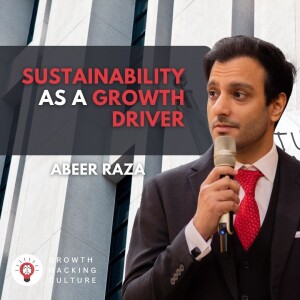
Monday Feb 26, 2024
Monday Feb 26, 2024
According to McKinsey, 70% of companies plan to implement sustainability projects in the next year, a significant increase from 2019's 40%.
This growing focus on sustainability benefits businesses and the environment alike, allowing companies to reduce their environmental impact, enhance their reputation, and gain a competitive edge.
But sustainability goes beyond environmental concerns. It's about redefining organizational practices. Join us as we explore this vital topic with an expert who has aided countless enterprises in their transformation journey.
About Abeer Raza
Meet the Chief Marketing Officer and founding partner of TekRevol, a leading digital transformation company ranked on the prestigious Inc. 5000 list. With an impressive growth rate of 829% over four years, TekRevol has established itself as a powerhouse in the industry.
Reaching out Abeer Raza
LinkedIn https://www.linkedin.com/in/abeerraza/ or simply by email at abeer@tekrevol.com
TekRevol Website https://www.tekrevol.com/
What We Discussed in the Episode:
Defining Sustainability in Abeer's Words
Enhancing Sustainability Across Economic, Social, and Environmental Fronts
Fixing goals in sustainability doesn’t always work - as it is perceived that the effort of starting is replaceable with the priorities of the moment - What would be the best action to start caring about sustainability?
Authenticity Check: Ensuring Sustainability Goes Beyond Lip Service
Cultivating a Sustainable Culture: Leadership Strategies for Employee Engagement
Additional resources about Sustainability
How can organizations start linking Purpose and Sustainability? Podcast episode with Sebastien Cretegny https://youtu.be/_1jwLtBxadg
What is a Sustainable business strategy? https://www.thecornerstoneadvisory.com/our-insights/what-exactly-is-a-sustainable-business-strategy
Embracing The Human Element: How Modern Businesses Can Commit To Corporate Social Responsibility [article by Abeer] https://www.forbes.com/sites/theyec/2019/07/16/embracing-the-human-element-how-modern-businesses-can-commit-to-corporate-social-responsibility/?sh=5ac054907eff
###
About the Growth Hacking Culture Podcast
The Growth Hacking Culture Podcast is a series of insightful interviews with prominent experts on mindsets, skills and mental resources to grow individually, lead motivated teams and create human-centric work cultures. These episodes are about thought provoking ideas to scale up and growth hack human-centric and performing work cultures. Hosted by Ivan Palomino.
This episode is sponsored by:
PeopleKult [behavioral science, tech and analytics to scale up the next generation work culture]
The Cornerstone Advisory [innovation, performance and growth for future-focused organizations]
Code: 6c98cb1216a27867746f40f2af4f23cb551786e9
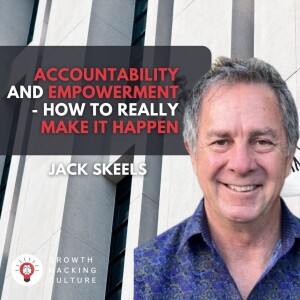
Tuesday Feb 20, 2024
Tuesday Feb 20, 2024
Many organizations grapple with a crucial issue – the effectiveness of their managers => Only 22% of employees strongly believe their organization's leadership has a clear direction, while just 15% feel enthusiastic about the future. Additionally, a mere 13% think leadership communicates effectively within the organization.
This prompts a vital question: do we need to reconsider and redefine the role of managers in organizations?
About my Guest Jack Skeels (author of Unmanaged)
Meet Jack Skeels, a distinguished executive and two-time Inc. 500 award winner, with a background as a former RAND senior analyst. As a frequent keynote speaker and published thought leader, he brings a wealth of expertise to the table. Currently serving as the CEO and founder of AgencyAgile, Jack specializes in helping agencies navigate the chaotic agency environment. His approach involves restoring productivity, profitability, and fun through a proprietary culture-based team-empowerment model and agile methodology.
Jack Skeels is also the author of the insightful book, "Unmanaged: Master the Magic of Creating Empowered and Happy Organizations." Dive into his wealth of knowledge to unlock the secrets of organizational empowerment and happiness.
Connect with Jack on Linkedin https://www.linkedin.com/in/jackaskeels/ or in AgencyAgile https://agencyagile.com/
What We Discussed in this Episode:
- Is There a Need for Traditional Managers in Today's Dynamic Work Environment?- Magic Wand Moments: You get a magic wand: to change the typical training for managers around the world [when it happens] - what would be the most important topics of this ‘global’ training?- Leadership Revolution: Organizations Pioneering the 'Managing Less' Movement- Beyond Metrics: Unveiling the Secrets to Measuring Success for Exceptional Managers- Managerial Mastery: The One Hack Every Manager Should Aim to Master for Unparalleled Success
Additional resources:
📑🧠Read on Self-Awareness: The Bedrock of Human-Centric Leadership
This article emphasizes the crucial role of self-awareness in becoming a more effective leader. It dives into both internal and external awareness, providing practical habits to cultivate a deeper understanding of yourself and your impact on others.
📑🧠 Read on How to Transition from Managing to Leading
Moving from managing tasks to inspiring people requires a specific skillset. This article outlines 5 key skills to hone as you transition from manager to leader, emphasizing the importance of empathy, communication, and vision.
📑🧠 Read on What to Say and Do to be a Badass Inspiring Leader
Creating a vibrant, positive work environment is essential for attracting and retaining top talent. This article dives into specific phrases and actions effective leaders use to cultivate a thriving culture where everyone feels valued and supported.
###
About the Growth Hacking Culture Podcast
The Growth Hacking Culture Podcast is a series of insightful interviews with prominent experts on mindsets, skills and mental resources to grow individually, lead motivated teams and create human-centric work cultures. These episodes are about thought provoking ideas to scale up and growth hack human-centric and performing work cultures. Hosted by Ivan Palomino.
This episode is sponsored by:
PeopleKult [behavioral science, tech and analytics to scale up the next generation work culture]
The Cornerstone Advisory [innovation, performance and growth for future-focused organizations]
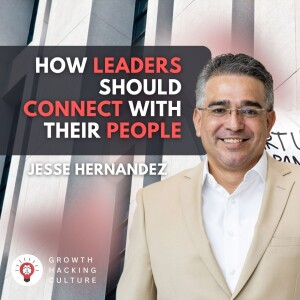
Monday Feb 12, 2024
Jesus Jesse Hernandez on How Leaders Should Connect with their People
Monday Feb 12, 2024
Monday Feb 12, 2024
A recent Gallup study reveals a concerning fact: only 32% of employees strongly feel connected to their colleagues, impacting various aspects of business success. This lack of connection leads to reduced productivity, increased absenteeism, higher turnover rates, and lower customer satisfaction.
Highlighting the issue, the Society for Human Resource Management reports that 47% of employees admit to feeling lonely at work. Addressing this is not just a moral imperative but a strategic move for business success.
To combat these challenges, businesses can implement strategies like team-building activities and open communication channels to foster a sense of belonging, unlocking the full potential of every employee.
About Jesus Jesse Hernandez
Meet Jesse Hernandez Jr, the author of "Becoming the Promise You Are Intended to Be" and Founder of Depth Builder LLC. With a focus on enhancing communication skills and fostering trust in improvement initiatives, Jesse guides leaders by illuminating their blind spots. He teaches them adaptive leadership approaches that secure employee "buy-in."
Drawing from extensive experience in the construction industry, Jesse addresses a noteworthy aspect: despite the daily interactions between manual and office personnel (constituting 60% of the workforce), the challenges of these interactions are often overlooked.
Connect with Jesse on LinkedIn https://www.linkedin.com/in/jessedepthbuilder/
Read his book Becoming the Promise You are Intended to Be https://www.amazon.com/Becoming-Promise-You-are-Intended/dp/B0C4WVPLLK
Jesse's Business Site The Depth Builder https://www.depthbuilder.com/
What We Discussed in this Episode on How Leaders should Connect with their People:
- Navigating Communication: Manual Workers vs. Office Personnel - Key Differences?- Avoiding Pitfalls: Common Mistakes in Team Communication- Fostering a Safe Workplace: Daily Habits for Employee Expression- Guiding Teams: Techniques for Constructive Feedback and Guidance- Lean Methodology Enthusiast: Improving Team Connection Continuously?- Empowerment in Leadership: Cultivating Ownership and Decision-Making
###
Subscribe to our monthly Simply Human Newsletter https://simplyhuman.substack.com/
###
About the Growth Hacking Culture Podcast
The Growth Hacking Culture Podcast is a series of insightful interviews with prominent experts on mindsets, skills and mental resources to grow individually, lead motivated teams and create human-centric work cultures. These episodes are about thought provoking ideas to scale up and growth hack human-centric and performing work cultures. Hosted by Ivan Palomino.
This episode is sponsored by:
PeopleKult [behavioral science, tech and analytics to scale up the next generation work culture]
The Cornerstone Advisory [innovation, performance and growth for future-focused organizations]
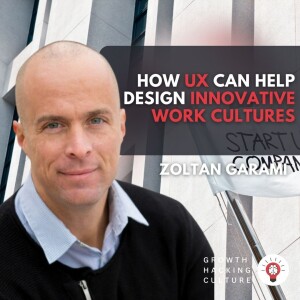
Monday Feb 05, 2024
Zoltan Garami on How UX can Help Design Innovative Work Cultures
Monday Feb 05, 2024
Monday Feb 05, 2024
Discover the profound impact of creativity and innovation within the pages of Zoltan's Book: UX & Beyond: Real-life Product Design and User Experience. This book goes beyond the expectations of designers, catering to anyone keen on nurturing their creativity. It serves as a valuable resource for individuals and teams looking to enhance skills, competencies, and foster innovation. "UX & Beyond" is not just for design enthusiasts; it's a guide for unlocking creative potential, making it a must-read for those striving for personal and professional growth in an innovative world.
About Zoltan Garami
Meet Zoltán Garami, a 17-year veteran in Product Design and User Experience. With a diverse portfolio spanning startups to large enterprises, Zoltán excels in guiding products from concept to delivery. His expertise extends beyond design, incorporating UX research methodologies to ensure a holistic user-centric approach. Zoltán has mastered challenges in web design, interface design, branding, and more. Explore his insights in "Ux & Beyond: Real-life Product Design and User Experience" for a shortcut to success in product design and user experience.
Reach out Zoltan on LinkedIn https://www.linkedin.com/in/garamiz/
Learn more about his book UX & Beyond on https://uxandbeyondbook.com/
What We Discussed in this Episode on Designing Innovative Work Cultures:
- Define Workplace Innovation: Your Personal Take- Key Routines for Creative Leadership Success- Boosting Human-Centric Creativity in Team Leaders- Spotting and Nurturing Creative Talent: Cues to Watch- Mindfulness and Meditation: Catalysts for Creative Team Building- Design Thinking: Recommendations for 'UX & Beyond' Excellence- Decoding Human Psychology in Product Failures- The Power of Sharing Thoughts: Why It Matters
###
About the Growth Hacking Culture Podcast
The Growth Hacking Culture Podcast is a series of insightful interviews with prominent experts on mindsets, skills and mental resources to grow individually, lead motivated teams and create human-centric work cultures. These episodes are about thought provoking ideas to scale up and growth hack human-centric and performing work cultures. Hosted by Ivan Palomino.
This episode is sponsored by:
PeopleKult [behavioral science, tech and analytics to scale up the next generation work culture]
The Cornerstone Advisory [innovation, performance and growth for future-focused organizations]
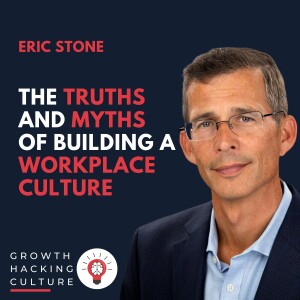
Sunday Jan 28, 2024
Sunday Jan 28, 2024
In a McKinsey study, it was found that 70% of corporate culture transformations fail. These failures often result from misalignment with business strategy, lack of leadership commitment, insufficient employee engagement, ineffective communication, and a lack of measurement.
Successful navigation of cultural change requires a strategic approach that addresses these challenges dynamically for a higher likelihood of success.
About my guest Eric Stone
As the Founder of Clear Path Ventures, Eric Stone specializes in expertly guiding young professionals and businesses on their journey to success. With a rich twenty-six-year career at the renowned rental car company Enterprise Holdings, Eric quickly became one of the most accomplished Regional Vice Presidents.
Eric Stone is also the author of "Jumpstart Your Workplace Culture: A Road Map for Igniting High Performance," offering valuable insights into cultivating a thriving work environment for optimal productivity and success. Whether one is a budding professional or a growing business, Eric Stone and Clear Path Ventures serve as the compass on the road to achieving excellence.
Get his book 📕 Jumpstart Your Workplace Culture: A Road Map for Igniting High Performance: https://www.amazon.com/Jumpstart-Your-Workplace-Culture-Performance/dp/163755396X
How to Reach Eric Stone
The Clear Path Ventures Website https://clearpathventures.com/
His LinkedIn Profile https://www.linkedin.com/in/eric-stone-clear-path/
What We Discussed in this Episode about the myths of Culture Change:
- Is this True or a Myth or partly true? - The impact of work culture on business outcomes has never been measured - People need to be told about the new culture through regular in-class trainings and manuals - Building a new culture is based on iterations - you measure, assess results and pivot if necessary - Managers are the one that know where we stand in terms of culture and performance - Changing culture needs consultants to kick start
- Mastering Cultural Transformation: A Glimpse into Companies' Success Stories
- The Silent Red Flag: Overlooked Symptoms Calling for Cultural Change
- Avoid These Cultural Change Pitfalls: Worst Ways to Kickstart Transformation
- What are the worst ways to start a cultural change?
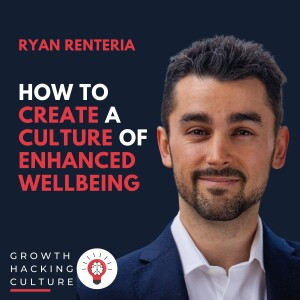
Monday Jan 22, 2024
Ryan Renteria on How to Create a Culture of Optimized Wellbeing
Monday Jan 22, 2024
Monday Jan 22, 2024
In a recent 2023 survey conducted by the American Psychological Association, findings revealed a notable surge in workplace burnout, with 77% of employees experiencing it —a marked increase from the 61% reported in 2018. The study highlighted higher burnout rates among women (83%) compared to men (66%), as well as a prevalence among younger workers (85%) in contrast to their older counterparts (70%).
Is it possible to be great at everything that matters most to us, without missing on our wellbeing?
About this episode guest: Ryan Renteria
Ryan brings nine years of experience from Goldman Sachs and prominent hedge funds to his profile. He holds a BA in economics from Stanford University and is the author of the book 'Lead without Burnout: Growth with Less Stress for You and Your Team.' Additionally, Ryan is the founder of Stretch Five, a prominent executive coaching firm.
Reach out Ryan Renteria on his LinkedIn profile https://www.linkedin.com/in/ryan-renteria/ or in his company website https://thestretchfive.com/
What We Discussed in the Episode on How to Create a Culture of Optimized Wellbeing
- Escaping Toxic Work Cultures: Breaking the Money Trap and Moving Forward- Assessing Corporate Responses to Burnout Signs: Are Companies Walking the Talk?- Recognizing Burnout Indicators: How Leaders Can Identify Struggling Team Members- Balancing Well-being in Fast-Paced Work Environments: Feasibility and Genuine Care- Embracing Alternative Well-being Practices: Incorporating Mindfulness and Regular Breaks in Corporate Settings- Shifting Focus in Corporate Training: Addressing Systemic Challenges over Well-being Patchwork
About Ryan's book Lead without Burnout - Growth with Less Stress for You and Your Team
In Lead without Burnout, Ryan Renteria shatters the myth that you must sacrifice ambitious professional growth to achieve better balance and enjoy stronger mental and physical health. Lead without Burnout shows you how to slash stress, achieve phenomenal business performance, and live a happy and fulfilled life.
Learn more on www.leadwithoutburnout.com or buy it in Amazon https://www.amazon.com/Lead-without-Burnout-Growth-Stress/dp/B0CLHVQW13
###
About the Growth Hacking Culture Podcast
The Growth Hacking Culture Podcast is a series of insightful interviews with prominent experts on mindsets, skills and mental resources to grow individually, lead motivated teams and create human-centric work cultures. These episodes are about thought provoking ideas to scale up and growth hack human-centric and performing work cultures. Hosted by Ivan Palomino.
This episode is sponsored by:
PeopleKult [behavioral science, tech and analytics to scale up the next generation work culture]
The Cornerstone Advisory [innovation, performance and growth for future-focused organizations]
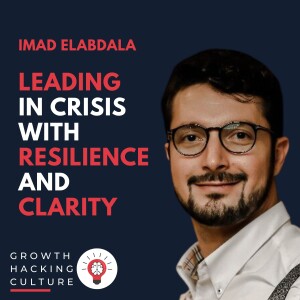
Monday Jan 15, 2024
Imad Elabdala on Leading in Times of Crisis with Resilience and Clarity
Monday Jan 15, 2024
Monday Jan 15, 2024
Preparing leaders to lead in times of crisis is a major challenge for organizations that gains in importance as we transition into a Human Centric Workplace:
In a recent McKinsey Global Institute study, it was revealed that companies demonstrating proficient crisis leadership boast a 3.3 times higher probability of surpassing their industry counterparts.
Similarly, a 2022 Harvard Business Review study highlighted that leaders fostering psychological safety among their workforce exhibit a greater likelihood of achieving success during periods of crisis.
“Faced with crisis, the man of character falls back on himself. He imposes his own stamp of action, takes responsibility for it, makes it his own.” - De Gaulle
About my guest Imad Elabdala
As an authority in Change Leadership, Imad Elabdala combines the art of storytelling with scientific principles, orchestrating impactful global sessions focused on self-leadership and resilience.
Imad Elabdala spearheaded Kidnovation, a globally acclaimed educational technology platform dedicated to nurturing emotional intelligence and leadership competencies among students. The platform's excellence earned prestigious recognition, including Sweden's Royal Entrepreneurial Award.
Through Hero To Be, Imad Elabdala has empowered over 17,000 individuals across diverse backgrounds, providing customized mental health tools. This impactful initiative earned the UN Global Innovation Award in 2020 for its outstanding contribution to community welfare and mental well-being.
He is also the founder of Magic Bean Innovation Labs - A Venture Studio empowering founders & transforming visions into award-winning, industry-disrupting innovations!
How to reach Imad:
On LinkedIn https://www.linkedin.com/in/imadelabdala/
On Instagram https://www.instagram.com/imadelabdala/
Watch his TedTalk on Vulnerability as a key to confidence. A story of resilience https://www.ted.com/talks/imad_elabdala_vulnerability_as_a_key_to_confidence_a_story_of_resilience
What We Discussed in this Episode on Leading in Crisis with Resilience and Clarity
- Assessing Leaders' Distinctions Between Genuine Crises and Workplace Pressures- Examining Brain Responses in Crisis for Team Leaders versus Contributors- Balancing Vulnerability and Strength in Leadership Expectations- Developing Crisis-Ready Habits for Effective Leadership- Understanding Variances in Acquiring Resilience Across Gender and Generations- Identifying the Most Detrimental Behaviors in Crisis Leadership- Reevaluating the Relevance of Icons like Jack Welch and Steve Jobs in Modern Leadership
More about Leading in times of crisis:
Ron Carucci on How to be a Human Centered Leader in Times of Financial Crisis
https://www.youtube.com/watch?v=d_Ol9OvyKRk
###
About the Growth Hacking Culture Podcast
The Growth Hacking Culture Podcast is a series of insightful interviews with prominent experts on mindsets, skills and mental resources to grow individually, lead motivated teams and create human-centric work cultures. These episodes are about thought provoking ideas to scale up and growth hack human-centric and performing work cultures. Hosted by Ivan Palomino.
This episode is sponsored by:
PeopleKult [behavioral science, tech and analytics to scale up the next generation work culture]
The Cornerstone Advisory [innovation, performance and growth for future-focused organizations]
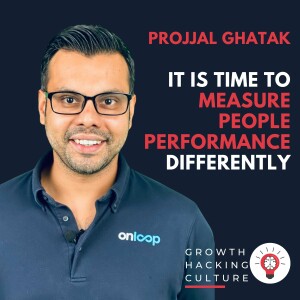
Sunday Jan 07, 2024
Sunday Jan 07, 2024
A 2022 Gallup poll discovered that just 2 in 10 employees find their company's performance management system motivating for their best work. Over 90% of HR leaders expressed dissatisfaction with traditional performance reviews, citing concerns about their effectiveness, fairness, and impact on employee engagement.
People Performance remains a significant challenge for many employees - there must be better way to make it happen!!
Specific employee complaints about performance reviews include inaccuracies (74%), feeling blindsided (62%), managers lacking feedback readiness for millennials (around 60%), and 4 in 10 U.S. employees disengaging when feedback is lacking.
About JJ (Projjal) Ghatak [founder of OnLoop]
Having previously held roles at Accenture and Uber, coupled with experience in venture capital, Projjal recognized the shortcomings of traditional development and performance review methods within corporate structures. Fueled by dissatisfaction, he took the initiative and established OnLoop in 2020, aiming to revolutionize these practices.
JJ's educational journey includes studies at Stanford and SMU (Singapore), leveraging this academic background to spearhead innovative changes in the realm of corporate development and performance assessments.
Want to reach out JJ?
His LinkedIn Profile https://www.linkedin.com/in/pgonloop/
About OnLoop
OnLoop is an AI powered habit-building platform ensures that teams are motivated, aligned, and accountable
The OnLoop website https://www.onloop.com/
What We Discussed in this Episode on Measuring People's Performance differently
- Challenges with Traditional Yearly Performance Reviews: Why Do They Often Fail Employees?- Defining Ideal Performance Metrics: What Should Companies Measure Beyond Standard Objectives?- The Future of Performance Enhancement: Leveraging AI's Role in Individual and Business Improvement- Guiding Organizational Change: Recommendations for HR Leaders and Essential Learning Areas- Linking Individual Performance to Evolving Organizational Culture: Strategies for Change- Employee Privacy Concerns: Risks Associated with Technology Revealing Employee Sentiments- Enhancing Human Skills in Corporate Training: Effective Methods for Developing Behavioral and Meta-Skills
###
About the Growth Hacking Culture Podcast
The Growth Hacking Culture Podcast is a series of insightful interviews with prominent experts on mindsets, skills and mental resources to grow individually, lead motivated teams and create human-centric work cultures. These episodes are about thought provoking ideas to scale up and growth hack human-centric and performing work cultures. Hosted by Ivan Palomino.
This episode is sponsored by:
PeopleKult [behavioral science, tech and analytics to scale up the next generation work culture]
The Cornerstone Advisory [innovation, performance and growth for future-focused organizations]
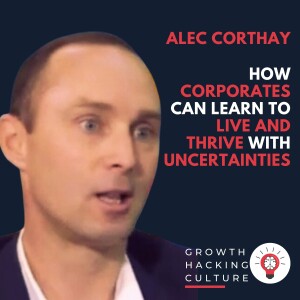
Tuesday Dec 26, 2023
Alec Corthay on How Corporates Can Learn to Live and Thrive with Uncertainty
Tuesday Dec 26, 2023
Tuesday Dec 26, 2023
Recent research has shed light on the apprehension CEOs harbor towards uncertainty. A 2019 Harvard Business Review study revealed a tendency among CEOs to shy away from decision-making in uncertain situations, even when such decisions could significantly influence a company's success. The study's findings attribute this behavior to the inherent risk aversion of CEOs, who prioritize decisions geared toward minimizing potential losses.
Another pertinent study, featured in the journal "Organizational Behavior and Human Decision Processes," unveiled that uncertainty often prompts CEOs to make impulsive decisions. This tendency arises due to cognitive biases like the sunk cost fallacy, posing challenges for CEOs in maintaining rational decision-making processes.
This topic needed a recognized expert on risk and uncertainty - welcome to my guest Alec Corthay
About Alec Corthay [expert in the management of uncertainty]
Meet Alec Corthay, a seasoned management expert renowned for his expertise in handling uncertainty. With a background in advisory roles at EY and Cegos, Alec brings over two decades of experience to the table. He has also served as a CIA-certified internal auditor and holds a degree in economics from HEC Lausanne.
As a prominent figure, Alec engages as a speaker, facilitator, and corporate trainer, leveraging his insights to guide leaders in navigating uncertainty effectively. He imparts knowledge and techniques honed through years of experience in his roles, sharing invaluable expertise gained from teaching at prestigious institutions such as Centrale and Mines Paris engineer schools.
Moreover, Alec is the visionary founder and CEO of Zerra, a testament to his dedication and leadership in the realm of uncertainty management.
Reach out Alec on https://www.linkedin.com/in/aleccorthay/
and on his company website Zerra https://www.zerra.fr/
What We Discussed in this Episode on How Corporates Can Learn to Live and Thrive with Uncertainty
- Transforming Corporate Culture: Strategies to Shift from Risk Aversion to Calculated Risk-Taking- Balancing Control and Entrepreneurship: Practical Approaches for Organizational Operations- Building Personal Agility: Techniques to Enhance Individual Capacity for Adaptability- Fostering Virality in Uncertainty: Cultivating a Culture of Thriving Amidst Ambiguity- The Vital Role of Agility and Flexibility in Navigating an Uncertain Business Landscape- Harnessing Data Analytics for Proactive Response: How Predictive Modeling Aids Corporations in Addressing Challenges- Striking the Right Balance: Assessing Control and Agility Alignment in Corporate Structures
###
About the Growth Hacking Culture Podcast
The Growth Hacking Culture Podcast is a series of insightful interviews with prominent experts on mindsets, skills and mental resources to grow individually, lead motivated teams and create human-centric work cultures. These episodes are about thought provoking ideas to scale up and growth hack human-centric and performing work cultures. Hosted by Ivan Palomino.
This episode is sponsored by:
PeopleKult [behavioral science, tech and analytics to scale up the next generation work culture]
The Cornerstone Advisory [innovation, performance and growth for future-focused organizations]
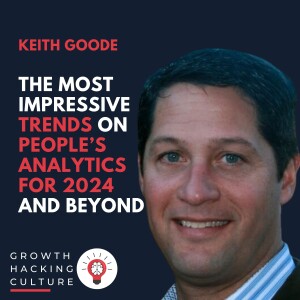
Sunday Dec 17, 2023
Keith Goode on Trends on People’s Analytics for 2024 and Beyond
Sunday Dec 17, 2023
Sunday Dec 17, 2023
In the past few years, there has been significant improvements in people analytics. As we move into 2024, HR teams are urged to harness the power of recruitment, hiring, retention, motivation, and developmental data. The demand for people analytics is anticipated to surge further in 2024. Establishing a structured framework is crucial for businesses to comprehend this data and seamlessly integrate its insights into the organizational fabric.
About Keith Goode from ZeroedIn Technologies
Keith Goode serves as the Vice President of Client Services at ZeroedIn Technologies, a cutting-edge platform specializing in converting HR, talent, and business data into actionable insights. With a robust background spanning over two decades, Keith has adeptly implemented and supported human capital management and business intelligence solutions.
What We Discussed in this Episode about Key Trends on People’s Analytics:
- What is the key Information Companies Must Acquire About People for Business Success in 2024- Impact of AI and NLP [Neurolinguistic Programming] on HR Technology: Advancements from a Year Ago and Present Capabilities- Primary Obstacles for Companies Embracing People Analytics: Resources, Knowledge, or Financial Constraints?- Empowering HR Professionals: Strategies to Enhance Tech Proficiency and Skill Acquisition- Current Trends in Assessing Corporate Work Culture: Insights and Developments- As CEO of a Fortune 500 Company, What are the Crucial People Insights for Frequent Monitoring
Bonus Material on Trends 2024
Key Trends 2024 in the workplace https://www.peoplekult.com/post/the-human-centric-workplace-top-trends-for-2024
How to make creativity be the driver of business growth in 2024 https://www.thecornerstoneadvisory.com/our-insights/how-creativity-drives-business-innovation-and-growth
###
About the Growth Hacking Culture Podcast
The Growth Hacking Culture Podcast is a series of insightful interviews with prominent experts on mindsets, skills and mental resources to grow individually, lead motivated teams and create human-centric work cultures. These episodes are about thought provoking ideas to scale up and growth hack human-centric and performing work cultures. Hosted by Ivan Palomino.
This episode is sponsored by:
PeopleKult [behavioral science, tech and analytics to scale up the next generation work culture]
The Cornerstone Advisory [innovation, performance and growth for future-focused organizations]









